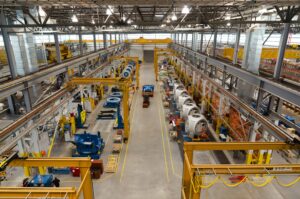Cloud computing is revolutionising business IT, improving collaboration and productivity as well as allowing for significant cost reductions. In this piece Rajarshi Purkayastha, Head, Pre-Sales, India and MECAA, Tata Communications, explores how cloud is transforming the global manufacturing economy and the benefits it can bring to organisations in the sector.
If there is one technology that has catapulted to every organisation’s top priority list it is the cloud. Catalysed by digital experience platforms, self-serve portals, and virtualised collaboration, businesses are adopting modern technologies to differentiate and compete in market. Yet, the shift is still gradual. While some industries like eCommerce, IT, and finance have matured their cloud strategy, and are reaping the benefits, others are yet to fully maximise the potential of cloud – the manufacturing sector being case in point. 
What is holding manufacturing back?
“Cloud-native” in manufacturing operations remains less mature than on-premise deployments. This is because it is still difficult to customise due to the complexity of the legacy processes, and also because it presents integration challenges in absence of readily available API or any electronic interfaces.
“Designing and orchestrating a hybrid cloud environment that suits business requirements and integrates different parts of the manufacturing ecosystem alongside existing legacy infrastructure is also a complex process.”
Regulatory and compliance requirements can pose a challenge for cloud models — especially where sensitive data is involved. In addition to this, IT units in manufacturing are learning the ropes of negotiating service agreement including license terms and conditions with vendors selling cloud-native business applications.
It is time that manufacturing enterprises realise their cloud moment.
The manufacturing lifecycle extends right from R&D to demand sensing, from supply chain, production to distribution and after sales. Cloud has the ability to transform the entire manufacturing lifecycle by embedding digital and centralised solutions at each phase of the journey which enables companies to be responsive, re-configurable, adaptable, and flexible. In one word, it allows companies to be agile.
“Cloud can revamp the existing decentralised and distributed processes like demand sensing, production into one seamless and centralised unit which will help manufactures to design and launch more customer centric, targeted products in a time bound manner.”
It can transform the production processes, from how products are researched, designed, and developed through highly scalable and secured testbeds, to how they are manufactured, distributed, and consumed. Cloud is also transforming and digitising the entire supply chain and fleet management for better tracking, monitoring and management perspective; it is also providing an integral view on how the production environments are getting integrated into industrial supply chains. This enables the “just-in-time” philosophy, which results in production efficiency with managed costs.
 Cloud and new-age technologies allows manufacturers to adopt many forms of new production systems, from 3D printing and high-performance computing (HPC) to the Internet of Things (IoT) and industrial robots. Moreover, cloud computing democratises access to and use of these technologies by small manufacturers. As an example, the Smart Factory uses different combinations of modern technologies to build hyper-flexible, self-adapting manufacturing capabilities. Frontline workers and technology interact in an open, connected, and coordinated fashion, reducing not only the overall production cost but the production time – which in turn fuels the digital supply chain and Industry 4.0 programmes.
Cloud and new-age technologies allows manufacturers to adopt many forms of new production systems, from 3D printing and high-performance computing (HPC) to the Internet of Things (IoT) and industrial robots. Moreover, cloud computing democratises access to and use of these technologies by small manufacturers. As an example, the Smart Factory uses different combinations of modern technologies to build hyper-flexible, self-adapting manufacturing capabilities. Frontline workers and technology interact in an open, connected, and coordinated fashion, reducing not only the overall production cost but the production time – which in turn fuels the digital supply chain and Industry 4.0 programmes.
Many manufacturers are turning to cloud computing to better manage their end-to-end production life cycle. Empowered Edge is being driven by IoT and the need to keep processing close to the plant, rather than on a centralised cloud server. However, instead of replacing existing systems at great expense, cloud and edge computing are evolving as complementary models to legacy architectures. Inside factories, this creates opportunities to access new data sources and improve insights into production performance.
More broadly, the maturation of 5G offers a creative way to decentralise manufacturing capacity into mobile factories which are smaller, more portable and supported by an ecosystem of partners. Globally, cloud technology looks set to enable manufacturing firms to increase their business activities and reduce their operating costs.
The impact of COVID-19
Global manufacturers are re-establishing business practices in line with new priorities. They are looking to: strengthen current production processes and workplace environments with smart manufacturing ecosystems, to improve worker safety, adhere to government mandates and ensure business continuity. The post-COVID era will be heavily driven by technology and managed by robust IT infrastructure, leading to borderless growth and productivity gains. The role of the technology leaders are very crucial in this time as they have to work on an agile digital foundation which can support and create digital models across the manufacturing value chain that has the ability to leverage and analyse data to create competitive advantages while establishing a framework for ubiquitous security.
Cloud can help manufacturing enterprises realise their goals of smart factories, intelligent production, and the larger Industry 4.0 transformation by enabling:
- Highly scalable IT infrastructure to run the resource hungry high-performance design tools
- State-of-the-art demand sensing through real-time data tracking and data analytics
- Collaborative smart processes and delivery of customised products
- Use of automation, AI/ML and IoT extensively
- Implementation of agile and efficient High-Performance Computing (HCI) in production
- A cloud enabled digital supply chain which connects every phases of the ecosystem from suppliers to consumers for better visibility and tracking
- Implement data analytics and data driven decision making to launch more customer centric products and campaigns
To summarise, Cloud Computing is transforming the global manufacturing economy by digitising virtually every facet of modern manufacturing process with the “smart manufacturing” or “Industry 4.0”. 
“At the enterprise level, cloud is impacting how companies manage their operations, from demand sensing to enterprise resource planning (ERP) and financial management to data analytics and workforce training.”
It is not only transforming the R&D, production processes and supply chains, cloud is playing a key role towards enabling and democratising new manufacturing production systems such as 3D printing (i.e., additive manufacturing), generative design, and the Industrial Internet of Things. In fact, digital services such as cloud computing now provide at least 25 percent of the total inputs that go into finished manufactured products.
Critical challenges for manufacturing organisations adopting cloud is still there, which includes dated IT Infrastructure and data management processes, managing the ERP environment, up-skilling, and re-skilling challenges etc. The cutting-edge technologies like AR/VR, Software Defined Network, Security Solutions, Collaboration tools or the SaaS and PaaS platforms can transform the current landscape, but everything is closely coupled with cloud, as cloud not only offers the compute and storage, it also facilitates the technology implementations. In essence, cloud computing will shape the future of manufacturing in a vast number of ways, broaden the horizon for future modernisation and its impact will be profound.
Discover more about the technology that’s helping to make the world a better place.
Transformational Hybrid SolutionsOur cloud-enablement services offer the best performance on your traffic-heavy websites or mission-critical applications.
Core NetworksTata Communications™ global IT infrastructure and fibre network delivers the resources you need, when and where you need them.
Network Resources
Unified Communications As A ServiceBreak the barriers of borders efficiently and increase productivity with Tata Communications’ UC&C solutions.
Global SIP ConnectEmpower your business with our SIP network and witness it grow exponentially.
InstaCC™ - Contact Centre As A ServiceCloud contact centre solutions for digital customers experience and agent productivity.
DIGO – Communications Platform as a ServiceDIGO is an in-network cloud communications platform, enabling you to power up converged contextual human-to-everything conversations globally.
Unified Communication Resources Case studies, industry papers and other interesting content to help you explore our unified communications solution better.
IoT SolutionsThe Internet of Things is transforming the way we experience the world around us for good. Find out more about our Internet Of Things related solutions here.
Mobility SolutionsTata Communications’ mobility services enable your enterprise to maintain seamless communication across borders, with complete visibility of cost and usage.
Mobility & IoT Resources
Multi-Cloud SolutionsWith enterprises transitioning to a hybrid multi-cloud infrastructure, getting the right deployment model that yields ROI can be a daunting task.
Cloud ComplianceCompliant with data privacy standards across different countries and is also designed to protect customers’ privacy at all levels.
IZO™ Cloud Platform & ServicesIZO™ is a flexible, one-stop cloud enablement platform designed to help you navigate complexity for more agile business performance.
Managed Infrastructure ServicesIntegrated with our integrated Tier-1 network to help your business grow efficiently across borders.
Cloud PartnersWe support a global ecosystem for seamless, secure connectivity to multiple solutions through a single provider.
Cloud Resources
Governance, Risk, and ComplianceRisk and Threat management services to reduce security thefts across your business and improve overall efficiencies and costs.
Cloud SecurityBest-in-class security by our global secure web gateway helps provide visibility and control of users inside and outside the office.
Threat Management - SOCIndustry-leading threat-management service to minimise risk, with an efficient global solution against emerging security breaches and attacks.
Advanced Network SecurityManaged security services for a predictive and proactive range of solutions, driving visibility and context to prevent attacks.
Cyber Security ResourcesCase studies, industry papers and other interesting content to help you explore our securtiy solution better.
Hosted & Managed ServicesTata Communications provide new models for efficient wholesale carrier voice service management. With our managed hosting services make your voice business more efficient and better protected
Wholesale Voice Transport & Termination ServicesYour long-distance international voice traffic is in good hands. End-to-end, voice access & carrier services which includes voice transport and termination with a trusted, global partner.
Voice Access ServicesTata Communication’s provide solutions which take care of your carrier & voice services, from conferencing to call centre or business support applications.
Carrier Services Resources
CDN Acceleration ServicesOur CDN Web Site Acceleration (WSA) solution helps deliver static and dynamic content, guaranteeing higher performance for your website.
CDN SecuritySafeguard your website data and customers’ information by securing your website from hacks and other mala fide cyber activities.
Video CDNDeliver high-quality video content to your customers across platforms – website, app and OTT delivery.
CDN Resources
Elevate CXIncrease customer satisfaction while empowering your service team to deliver world-class customer experience and engagement.
Live Event ServicesTata Communications’ live event services help battle the share if eyeballs as on-demand video drives an explosion of diverse content available on tap for a global audience.
Media Cloud Infrastructure ServicesTata Communications’ media cloud infrastructure offers flexible storage & compute services to build custom media applications.
Global Media NetworkTata Communications’ global media network combines our expertise as a global tier-1 connectivity provider with our end-to-end media ecosystem.
Use CasesUse cases of Tata Communications’ Media Entertainment Services
Remote Production SolutionsMedia contribution, preparation and distribution are highly capital-intensive for producers of live TV and video content, and their workflows are complex.
Media Cloud Ecosystem SolutionsThe Tata Communications media cloud infrastructure services offer the basic building blocks for a cloud infrastructure-as-a-service.
Global Contribution & Distribution SolutionsTata Communications’ global contribution and distribution solution is built to reduce capital outlay and grow global footprint.
Satellite Alternative SolutionsAs more and more consumers choose to cut the cord & switch to internet-based entertainment options, broadcasters are faced with capital allocation decisions.
LeadershipA look into the pillars of Tata communications who carry the torch and are living embodiment of Tata’s values and ethos.
Culture & DiversityHere at Tata Communications we are committed to creating a culture of openness, curiosity and learning. We also believe in driving an extra mile to recognize new talent and cultivate skills.
OfficesA list of Tata Communications office locations worldwide.
SustainabilityTata Communications adopts a holistic approach and harnesses the power of new-age technologies like 5G, IoT and AI to build a sustainable digital world.
FAQCheck out our FAQs section for more information.
BoardHave a look at our board of members.
ResultsFind out more about our quarterly results.
Investor PresentationsFollow our repository of investor presentations.
FilingsGet all information regarding filings of Tata communications in one place.
Investor EventsAll investor related event schedule and information at one place.
GovernanceAt Tata, we believe in following our corporate social responsibility which is why we have set up a team for corporate governance.
SharesGet a better understanding of our shares, dividends etc.
SupportGet all investor related contact information here.


